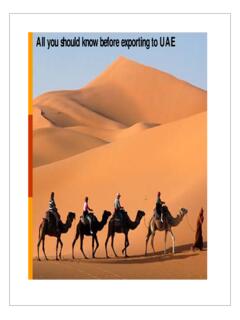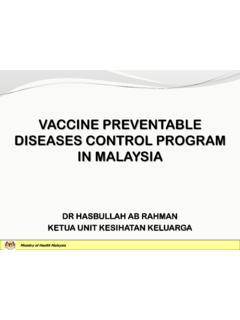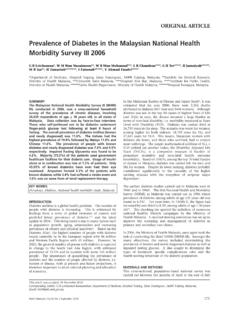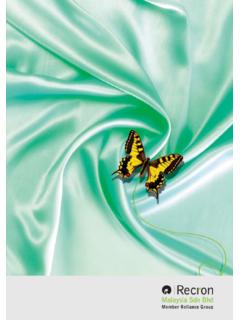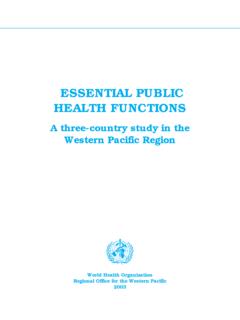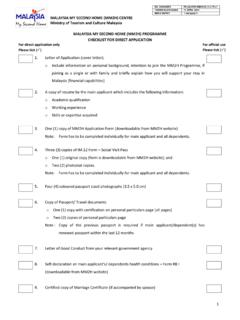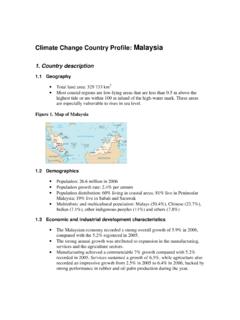Transcription of All you should know before exporting to Malaysia
1 All you should know before exporting to Malaysia Food Safety Standards In Major Export Markets: A Readymade Guide For Agro Exporters Table of Contents PROHIBITED GOODS .. 4 PRODUCT CERTIFICATION PROCESS .. 4 IMPORTS PROCEDURE .. 4 FOOD LAWS .. 5 OTHER REGULATIONS REQUIREMENTS .. 6 Plant and Plant Products .. 6 Live Animals/Birds .. 7 Meat and Poultry Products (except pork) .. 7 Health and Medicinal Food Products .. 8 Biotechnology Products .. 8 OTHER SPECIFIED STANDARDS .. 9 COPYRIGHT AND/OR TRADEMARK LAWS .. 10 RULES OF ORIGIN .. 10 LABELING REQUIREMENTS .. 11 A. General Requirements .. 11 B. Requirements Specific to Nutritional Labeling.
2 16 Nutrient content claim .. 19 Nutrient comparative claims .. 20 Nutrient function claim .. 22 PACKAGING AND CONTAINER REGULATIONS .. 23 FOOD ADDITIVE REGULATIONS .. 26 PESTICIDES AND OTHER CONTAMINANTS .. 27 MAXIMUM PERMITTED PROPORTION OF METAL CONTAMINANT IN SPECIFIED FOOD .. 28 Page 2 Food Safety Standards In Major Export Markets: A Readymade Guide For Agro Exporters PESTICIDE RESIDUE .. 42 PERMITTED PRESERVATIVE L I M I T S .. 68 PERMITTED FOOD ADDITIVE IN FOLLOW UP FORMULA .. 70 PERMITTED COLORING SUBSTANCE .. 74 PROHIBITED FLAVORING SUBSTANCE .. 77 PERMITTED FLAVORING SUBSTANCE .. 78 PERMITTED ANTIOXIDANT .. 80 PERMITTED FOOD CONDITIONER.
3 82 FOOD CONDITIONER THAT MAY BE ADDED TO SPECIFIED FOOD .. 85 PERMITTED NUTRIENT SUPPLEMENT .. 87 Permitted Bifido Bacteria in Food .. 98 MAJOR MALAYSIAN REGULATORY AGENCIES .. 99 Page 3 Food Safety Standards In Major Export Markets: A Readymade Guide For Agro Exporters PROHIBITED GOODS The goods prohibited from exporting in Malaysia , unless accompanied by relevant export license include sugar, rice and paddy, eggs, meat, live animals, cockles, skin and parts of birds, minerals and ores, plants, coral, live fish, oil palms, milk and related products, rubber seeds and palm seeds. PRODUCT CERTIFICATION PROCESS Product certification assures buyers that a product meets certain set specifications, a minimum level of performance, or set safety requirements.
4 Products manufactured in Malaysia , either to a Malaysian standard or a foreign standard issued by the respective national standards institutes are accepted by SIRIM for its Product Certification Marking Scheme. Thus, products certified by SIRIM will bear the Malaysian quality mark ( MS mark) or the safety mark ( S mark) to denote compliance with Malaysian standards specifications. The certified mark is used on products certified to a foreign national standard or international standard. In the case of products requiring mandatory certification, control labels are issued. The labels are security printed and serially numbered, and specific procedures and conditions for their use have been established to ensure all items can be traced to the respective manufacturers.
5 IMPORTS PROCEDURE Royal Customs and Excise Department, Ministry of Finance Malaysia Royal Customs and Excise Department is an agency of the Ministry of Finance responsible for ensuring efficient collection of indirect taxes such as customs duty (import and export), excise duty, sales tax, service tax and vehicle levy and the controls of carriers, persons and articles entering or departing Malaysia . This agency is governed by the Customs Act 1967. The Royal Customs and Excise Department is also given powers to enforce and control the prohibition of import and export of goods under more than 30 other laws and regulations administered by other departments and government agencies.
6 The Royal Customs and Excise Department cooperates with a number of other agencies, and a license and permit from responsible agency is necessary to import the following products: alcoholic beverages; animal and animal products; certain health and medicinal food products; meat and meat products; plant and plant products; poultry and poultry products. Imported goods may enter into Malaysia legally when shipment has arrived within the legal landing place and at customs airport. All goods to be imported whether or not subject to import Page 4 Food Safety Standards In Major Export Markets: A Readymade Guide For Agro Exporters duties must be declared in writing on Customs No.
7 1 form. All declarations should indicate a full and true account of the number and description of goods and packages, value, weight, measurement or quantity, and the country of origin or the final destination as the case may be. Declarations must be submitted to the Customs station at the place where the goods are to be imported. The Customs Act 1967 provides for importers to act on their behalf. Only agents who have been approved by the Director General of Customs can be appointed for this purpose. Applications to act as approved agents must be made to the Customs station where the goods are to be imported. Where duties such as import duty and sales tax are applicable on imported goods all relevant duties must be paid before such goods can be released.
8 The documents required by Malaysian customs are: Custom Entry form Evidence of right to make entry, bill of lading A Commercial Invoice or Pro forma invoice if a commercial invoice cannot be produced Packing List Other necessary documents to determine merchandise admissibility are such as certificate of origin, analysis etc. FOOD LAWS The Food Act 1983 and the Food Regulations 1985 of Malaysia govern the various aspects of food safety and quality control including food standards, food hygiene, food import and export, food advertisement and accreditation of laboratories. The enforcement of Food Act 1983 and the Food Regulations 1985 is targeted towards reducing food born hazard and ensuring that food is safe for human consumption.
9 The Food Safety and Quality Division (FSQD) of the Ministry of Health (MOH) is charged with the implementation and enforcement of the law. FSQD implements an active food safety program which includes routine compliance, sampling, food premises inspection, food import control activity and licensing of specified food substances required under Food Act 1983 and its Food Regulation 1985. It also conducts a food monitoring activity on specific food contaminants and additives. As a preventive approach, the FSQD have been implementing food handlers training program, vetting of food labels, giving advice to the industry and consumers, and food safety certification scheme such Health Certificate, HACCP certification and Free Sale Certificate.
10 Page 5 Food Safety Standards In Major Export Markets: A Readymade Guide For Agro Exporters Specific compositional and labeling requirements were developed for particular food products. The use of health claims on labels is very restrictive. The content requirements are not restrictive for Indian products, but receiving approval for new food additives, especially those not currently recognized by Codex Alimentarius can be onerous. Since more than half of the Malaysian population is Muslim, labeling requirements for products containing pork and alcohol are very strict. Attention should be given to adhering to Malaysian labeling requirements to avoid any problems at the port of entry or on the retail level.
